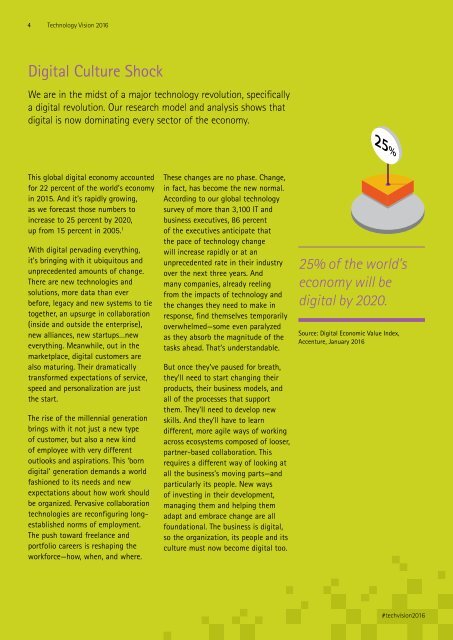Executive Summary
IT-Tech-Trends-Technology-Vision-Exec-Summary-2016
IT-Tech-Trends-Technology-Vision-Exec-Summary-2016
Create successful ePaper yourself
Turn your PDF publications into a flip-book with our unique Google optimized e-Paper software.
4 Technology Vision 2016<br />
Digital Culture Shock<br />
We are in the midst of a major technology revolution, specifically<br />
a digital revolution. Our research model and analysis shows that<br />
digital is now dominating every sector of the economy.<br />
This global digital economy accounted<br />
for 22 percent of the world’s economy<br />
in 2015. And it’s rapidly growing,<br />
as we forecast those numbers to<br />
increase to 25 percent by 2020,<br />
up from 15 percent in 2005. 1<br />
With digital pervading everything,<br />
it’s bringing with it ubiquitous and<br />
unprecedented amounts of change.<br />
There are new technologies and<br />
solutions, more data than ever<br />
before, legacy and new systems to tie<br />
together, an upsurge in collaboration<br />
(inside and outside the enterprise),<br />
new alliances, new startups…new<br />
everything. Meanwhile, out in the<br />
marketplace, digital customers are<br />
also maturing. Their dramatically<br />
transformed expectations of service,<br />
speed and personalization are just<br />
the start.<br />
The rise of the millennial generation<br />
brings with it not just a new type<br />
of customer, but also a new kind<br />
of employee with very different<br />
outlooks and aspirations. This ‘born<br />
digital’ generation demands a world<br />
fashioned to its needs and new<br />
expectations about how work should<br />
be organized. Pervasive collaboration<br />
technologies are reconfiguring longestablished<br />
norms of employment.<br />
The push toward freelance and<br />
portfolio careers is reshaping the<br />
workforce—how, when, and where.<br />
These changes are no phase. Change,<br />
in fact, has become the new normal.<br />
According to our global technology<br />
survey of more than 3,100 IT and<br />
business executives, 86 percent<br />
of the executives anticipate that<br />
the pace of technology change<br />
will increase rapidly or at an<br />
unprecedented rate in their industry<br />
over the next three years. And<br />
many companies, already reeling<br />
from the impacts of technology and<br />
the changes they need to make in<br />
response, find themselves temporarily<br />
overwhelmed—some even paralyzed<br />
as they absorb the magnitude of the<br />
tasks ahead. That’s understandable.<br />
But once they’ve paused for breath,<br />
they’ll need to start changing their<br />
products, their business models, and<br />
all of the processes that support<br />
them. They’ll need to develop new<br />
skills. And they’ll have to learn<br />
different, more agile ways of working<br />
across ecosystems composed of looser,<br />
partner-based collaboration. This<br />
requires a different way of looking at<br />
all the business’s moving parts—and<br />
particularly its people. New ways<br />
of investing in their development,<br />
managing them and helping them<br />
adapt and embrace change are all<br />
foundational. The business is digital,<br />
so the organization, its people and its<br />
culture must now become digital too.<br />
25% of the world’s<br />
economy will be<br />
digital by 2020.<br />
Source: Digital Economic Value Index,<br />
Accenture, January 2016<br />
#techvision2016


